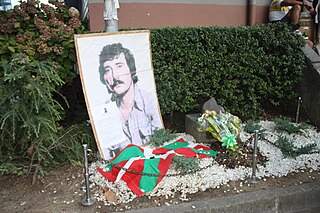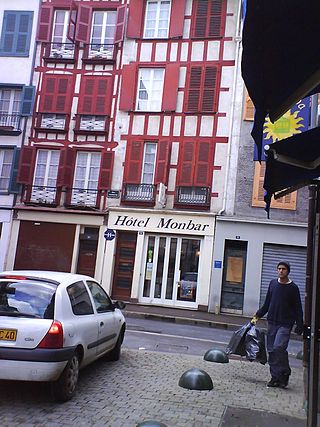Related Research Articles

GAL were death squads illegally established by officials of the Spanish government during the Basque conflict to fight against ETA, the principal Basque separatist militant group. They were active from 1983 to 1987 under Spanish Socialist Workers' Party (PSOE)-led governments.
The Batallón Vasco Español (BVE), sometimes associated with the Alianza Apostólica Anticomunista (AAA), Antiterrorismo ETA or Triple A, was a Spanish neo-fascist parapolice organization present mainly in the Basque Country and Southern France. It began operations in 1975, a year and a half after the murder of Luis Carrero Blanco by ETA and disbanded by April 1981. Some of its former members joined an organization formed not long after, known as the Grupos Antiterroristas de Liberación. The use of violence by the BVE was reported by ETA and its allies, who identified it as violence committed directly by the Spanish government against the Basque population. Manuel Fraga, former interior minister who was in office when the BVE was formed, defended it by saying it was a group of mayors who self-defended because ETA was going after them but had no influence in the course of the events.

On 30 December 2006, a van bomb exploded in the Terminal 4 parking area at the Madrid–Barajas Airport in Spain, killing two and injuring 52. On 9 January 2007, the Basque nationalist and separatist organisation ETA claimed responsibility for the attack. The attack, one of the most powerful carried out by ETA, damaged the airport terminal and destroyed the entire parking structure. The bombing ended a nine-month ceasefire declared by the armed organisation and prompted the government to halt plans for negotiations with the organisation. Despite the attack, ETA claimed that the ceasefire was still in place and regretted the death of civilians. The organisation eventually announced the end of the ceasefire in June 2007.
The 2009 Palma Nova bombing occurred on 30 July 2009, when a limpet bomb went off outside a Civil Guard barracks in the town of Palma Nova, Majorca, Spain. The bomb was placed under a patrol car and two Civil Guard officers died as a result of the explosion. A second device was found under another Civil Guard vehicle at nearby barracks and safely exploded by police. On 9 August, the Basque nationalist and separatist organisation ETA claimed responsibility for the attack, while four other bombs exploded around restaurants and shopping centres in Palma, Majorca, causing no injuries.

A van bomb went off on 19 May 2008 outside a boat club in the town of Getxo, Biscay in the Basque Country, Spain. The attack caused serious damage to the club, as well as nearby buildings and structures. No one was killed or injured after a warning call from the Basque separatist organisation ETA. On 31 May, the organisation claimed responsibility for the bombing.

The 1980 Ispaster attack was a gun and grenade attack by the Basque separatist organisation ETA which occurred on 1 February 1980 near the Basque town of Ispaster. The targets were a convoy of civil guards who were escorting workers and weapons from the nearby Esperanza y Cia Arms factory to Bilbao. A total of six civil guards were killed, while two ETA members were killed by hand grenades that they had thrown. The attack was the deadliest of 1980, the year when ETA killed more people than any other.
A car bomb attack was carried out by the Basque separatist organisation ETA on 11 December 1987. A vehicle containing 250 kilograms (550 lb) of ammonal was parked beside the main Guardia Civil barracks in the city of Zaragoza, Aragon, Spain; its explosion killed 11 people, including 5 children. Another 88 people were injured, the majority of them civilians.
A car bomb attack was carried out by the armed Basque separatist group ETA in Madrid, Spain, on 14 July 1986, which killed 12 people and injured another 32. The dead were all members of the Guardia Civil studying in the nearby traffic school on Príncipe de Vergara. The ETA members later convicted of participation in the attack included significant figures in the group, including Antonio Troitiño and Iñaki de Juana Chaos.
The 1980 Zarautz attack was a mass shooting gun attack by the Basque separatist organisation ETA which occurred on 3 November 1980 in the Basque town of Zarautz in Gipuzkoa. The targets were several off duty civil guards belonging to the traffic department, who were drinking in a bar in the town. The attack was the second deadliest of 1980, the year when ETA killed more people than any other.
The September 1982 Rentería attack was an ambush by the Basque separatist organisation ETA which occurred on 14 September 1982 on the motorway near the Basque town of Errenteria in Guipuzkoa. The targets were several national police officers, four of whom were killed in the attack, with the fifth seriously injured. The attack was ETA's deadliest of 1982.
A car bombing was carried out by the Basque separatist organisation ETA on 16 September 1991 in the town of Mutxamel near Alicante. The target was the Civil Guard barracks in the town. However the bomb initially failed to explode near its target. The police treated the car as an abandoned vehicle, not realising that it contained a bomb and while being towed away, the car bomb exploded, killing two police officers and the civilian towing the car away. The bombing was the deadliest of the 40 attacks which ETA carried out in the Province of Alicante between 1979 and 2004.
A car bomb attack was carried out by the armed Basque separatist group ETA in the Puente de Vallecas district of Madrid, Spain on 11 December 1995, which killed 6 people and injured a further 19. The target was a camouflaged army vehicle which was transporting nine civilian employees of the army towards the nearby motorway.

A car bombing was carried out by the armed Basque separatist group ETA in Sabadell, Catalonia, Spain on 8 December 1990.

The Monbar Hotel attack was carried out by the Grupos Antiterroristas de Liberación (GAL), a Spanish state-sponsored death squad, on 25 September 1985 in Bayonne, Pyrénées-Atlantiques, France. The targets were four members of the Basque separatist terrorist group Euskadi Ta Askatasuna (ETA), whom the Spanish government believed to be senior figures in the organization, itself proscribed as a terrorist group in Spain and France. All four people were killed, with a fifth person, apparently unconnected to ETA, injured in the shooting. This represented the deadliest attack carried out by the GAL. Although two of the participants were apprehended shortly after the shooting, controversy surrounded the possible involvement of senior figures in the Spanish police.
The 1980 Orio ambush was a gun and grenade attack by the Basque separatist organisation ETA which occurred on 13 July 1980 near the Basque town of Orio. The targets were a convoy of civil guards who had just finished their shift guarding the nearby munitions factory. Two civil guards were killed and three injured, while two ETA members were killed after the civil guards starting the new shift came to the assistance of their colleagues.
Many people have been imprisoned, placed on remand, or otherwise kept in custody due to their illegal activity in support of the Basque National Liberation Movement.
The assassination of Augusto Unceta Barrenechea was an attack by the Basque separatist group ETA which took place on 8 October 1977 in Guernica in the Basque Country in northern Spain.
David Pla Marín is a lawyer and Basque activist, who Spanish authorities believe to have been one of the three leaders of the Basque separatist group ETA at the time of the group's ceasefire declaration in October 2011. In 2000 Pla was condemned to six years imprisonment for planning an attack against the Mayor of Zaragoza, José Atarés. Pla is believed to be one of three people who read out the October 2011 ETA ceasefire declaration. He had previously been the leader of Basque separatist youth organisation Jarrai in the 1990s and had stood unsuccessfully as a candidate for Herri Batasuna in the 1995 local elections.
José Ignacio Iruretagoyena was a Spanish politician and victim of terrorism of the Basque separatist group Euskadi Ta Askatasuna (ETA).
References
- ↑ "ETA:Historia de 40 años de terrorismo, ABC, 2006". Archived from the original on 2011-07-24. Retrieved 2012-06-06.
- ↑ Timeline: Eta campaign, BBC News, 8 September 2010 accessed 6 June 2012
- 1 2 3 4 Asesinados cuatro guardias civiles en un bar de Marquina (Vizcaya), El Pais, 21 September 1980
- 1 2 Cuatro guardias civiles asesinados en un atentado, La Vanguardia, 21 September 1980, p5
- 1 2 Prisión para el etarra José Ramón Foruria por el asesinato de cuatro guardias civiles en Marquina, El Mundo, 26 September 2003
- ↑ Venezuela entrega a España al presunto etarra Foruria Zubialdea, La Vanguardia, 24 September 2003
- ↑ Condenan a un etarra casi 25 años después del atentado en el que murieron cuatro guardias civiles, El Mundo, 12 January 2005
- ↑ Todas las vidas rotas, Diario de Burgos, 31 January 2010